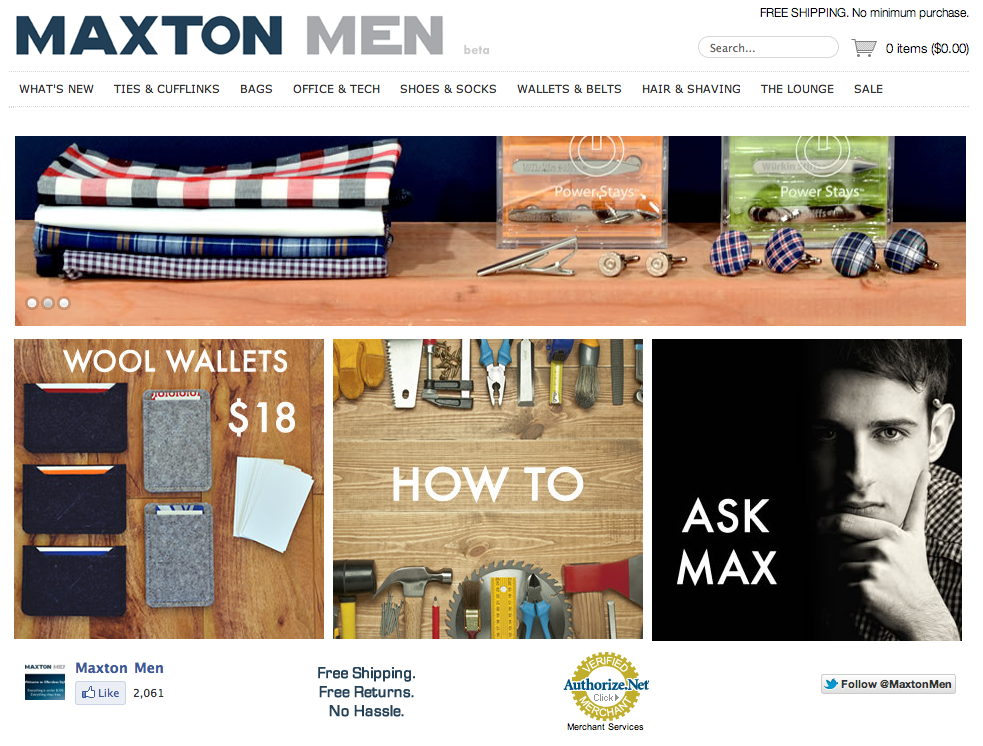Kishan Madamala was a manager of new business development at Target.com, but it was his three years as a store manager in a California Target store that taught him how to manage an online business.
Madamala said it wasn’t the corporate experience so much as the day-to-day efforts and logistical aspects of store management that truly prepared him for what running an online mens store would be like. When he launched MaxtonMen.com, which officially went live in October, 2011, Madamala wanted to fill a hole in the market for stylish menswear accessories, priced right and shipped to consumers’ homes free. While at Target, he said he noticed a saturation of what he calls “1.0 online retailers” – companies like Amazon and Target, which are very warehouse driven and want to be a one-stop-shop. He felt it left product discovery unfulfilled.
“It’s hard when you type ‘duffel bag’ into Amazon and get 20,000 results,” he said. Madamala said that the next phase of online retail, what he calls ecommerce 2.0, will involve lots more speciality retailers that have a distinct taste and cater to a niche audience who aligns with said taste.
That’s what he’s trying to do with Maxton Men, an online shop which sells everything from cuff links, socks and ties to iPhone cases, shoelaces and more – but no pants. The site does not sell apparel, and Madamala, said it’s because he wants it to be about the little details that make up a stylish man’s wardrobe.
“On the men’s side, there’s not a lot of great places to find new and emerging men’s brands,” said Madamala. “If you’re an up and coming men’s brand, you either try to sell a lot on the Internet or go the traditional route and get into a Nordstrom by being all over the buyers. The stuff we’ve been selling well is the lesser known brands that we’re introducing the customer to.”
Working as a Target store manager, 30-year-old Madamala learned how to deal with logistical decisions like what size boxes to ship products in for the least shipping costs, how to encourage people to get things shipped in groups, and what ground floor operations at a major retail establishment are like. He left the store and went back to school for an MBA, then returned to Target in the corporate sector, where he worked on strategy and business development and got a high level view of the online retail world. After seeing what he thought were gaps in the market, he decided to break off on his own with Maxton Men, a still small company, with about 8 to 10 part and full-time employees. Madamala dove right into Maxton as a full-time pursuit and began enthusiastically scouting brand partners who would align with his vision through both traditional routes (trade shows), and direct outreach over email and social networking.
“The big trade shows are really a buyer’s market,” he said. “There’s a lot of brands and fewer retailers. The ball is in the retailer’s court to find and pick the best retailers.”
Right now, the site is working with around 30 to 40 brands, all of whom share an aesthetic quality and brand image that can be described as somewhat classic, routed in tradition and have what Madamala calls a “heritage” feel. Another important facet of his retail partners is price point. Madamala thought it was important to find mid-market manufacturers who crafted quality, high-design goods that could be made available to men who are interested in style but can’t necessarily spend on luxury level goods.

“In the men’s space there was a glut of offerings in luxury,” said Madamala. “There’s only so many guys who can spend $200 on a tie or $500 on a bag. The margins are great but the market of guy’s for this is small. I’m looking more mid-market. Our target customer is in their 20’s and 30’s, somewhere between their first few jobs, out of college, maybe married with one kid. Someone who wants the nice things in life but can’t spend a ton of money on them.”
Madamala went with shopping cart solution Shopify to launch his site. He recommends using a software as a service provider who can take care of inventory, payment compliance, etc. The pre-established themes that come with such services are already are in good shape, he says, and he recommends hiring a designer to work on customization efforts and fine tune details.
The biggest lesson Madamala has learned in his time with Maxton Men is that the, “if you build it they will come” theory is not true.
“The Internet is so crowded with retail stores,” he said. “Merely putting something up there and having it indexed with Google is not enough. I’ve seen some people have to shut down their shops for this reason. They just assumed it would go viral. You have to think very long and hard about your marketing strategy and how you’re going to get in front of the right people – it’s the other half of the equation.”
But the first half is figuring out what makes your site different. For Maxton Men, it’s about the curated little details, and the idea that there is a voice behind the brand, a hypothetical, “Max,” who not only gives men style tips but also advice on the finer things in life like, how to light a fire without matches.
“You need something compelling enough for people to write about,” said Madamala, who added that it’s also important to offer a unique way to present products and let your customers shop. For Father’s Day, for instance, Maxton will be offering a gift pack in conjunction with a Polo shirt company called Vastrm that produces custom polo shirts and has previously produced shirts for select PGA golf players. While Maxton doesn’t sell apparel, it sees these types of special events as opportunities to forge partnerships.
Although young and ambitious, Madamala is also realistic about the competitive landscape online. He said that if you’re seeking investors for an online startup like his, it’s important to grab them at the right moment. He cited the “Rich vs. King” dilemma, where, as a start-up, one can veer toward being rich – giving up most stake in the company by gathering investors; or veer toward being king – where one refuses to seek investors because the number one priority is autonomy and control. He’s hoping to maintain creative control over Maxton for the most part, but also knows the value of the first option.
Mark Zuckerberg is rich and king; a model every online retailer would love to copy. But as Madamala says, that’s very rare.





Recent Comments